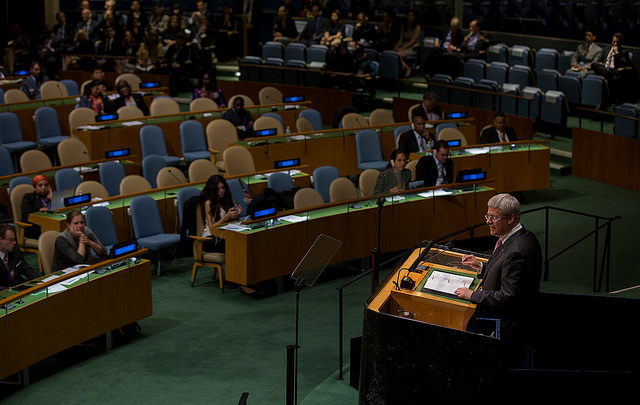Chip in to keep stories like these coming.
There was a cute moment in last Monday’s leaders’ debate on foreign affairs. Stephen Harper, with the worst environmental policy in the developed world, was arguing that he actually had the best — the most “responsible,” “balanced,” “transparent” and so on.
“He’s always doing that!” an exasperated Justin Trudeau blurted out, but he couldn’t nail him down.
What Harper is “always doing,” and with the slickness of a magician, is arguing that two and two make five and getting a third or more of the people to believe him.
And so it is with Canada’s role in the world. We are becoming a ship of fools adrift on international waters, and not only is that obscured by Harper’s doubletalk, but the opposition parties have failed to bring any of this to light, thanks to the fact that they’re mostly shooting at each other.
Harper is also getting some lucky breaks. One of those international surveys recently declared Canada the world’s “most admired nation.” Since Canada is almost invisible in the international news, the world knows little about us and is basically judging from the lingering glow of the last 50 years.
For anyone who knows anything, it’s a different story.
Consider the international scientists and prestigious journals like Nature who slammed Harper for muzzling government scientists, an outrage unprecedented in democratic countries — a group equally appalled by the destruction of libraries and scientific data, activities unknown outside totalitarian regimes.
There were the eminent international judges and lawyers — notably the Geneva-based International Commission of Jurists — who hit him for his attack on the chief justice of the Supreme Court. And there were the experts from all over the Western world who got together to express their dismay at the diminished international reputation of Elections Canada, tarnished by the patently unfair but slickly named Fair Elections Act.
And although diplomats don’t say much, there’s been a fairly constant drip of negative comment from allied capitals and from the emerging nations that used to admire us. These countries were astonished to find Canada, formerly a positive presence on everything from peacekeeping to the Law of the Sea to efforts to ban landmines, and many more, pulling out of international engagements and institutions and turning into an obnoxious and obstructionist presence on UN committees.
A recent example: Canada, as part of a UN committee that worked long and hard on a program to help poor Third World fishermen, last year killed the effort (it required unanimity) because it might theoretically benefit Palestinians. There were others, just as shameful. We were given a poke in the eye by an annoyed world community in 2010 when Canada was voted down for an expected position on the UN Security Council.
Then Harper pulled our aid efforts out of Africa — a zone now of emerging economies with which Canada has lost influence and, according to the experts, lost economic opportunities. Insofar as Harper’s plan was to cut foreign aid and concentrate it where it would bring more economic returns to Canada, shunning the advice of the diplomatic corps, that plan appears to be an incompetent flop.
Then there’s Israel, that unmentionable wedge issue. Harper is not so much pro-Israel as pro the right-wing religious extremists who are driving the occupation of Palestinian lands on the West Bank and torquing the government their way. This is resulting in what some alarmed moderate Jews are describing as the “de-legitimization” of Israel in world opinion. Arguably not good for Israel at all in the long run.
Hardly any of this came up in the debate, which reverted to domestic wedge issues like the niqab, to Harper’s advantage. But the relationship with the U.S. came up, and there Harper was “doing that” again. Everything was fine and dandy between him and U.S. President Barack Obama. Never mind that Obama talks to Mexico and Japan on trade without even a heads-up to Canada. The explanation might be that Obama sees Harper as an extension of the right wing of the Republican party, where in fact his true friends are. A not unreasonable assumption.
Or maybe it’s that Canada counts a lot less than it used to, in the eyes of both the U.S. and the rest of the world. Ripping up the Kyoto accord, withdrawing from world bodies, being a snarling presence at the UN, crowing about being a pollution-based “energy superpower,” strutting around like a bantam rooster in military pose — none of this has gone down well in foreign capitals.
A recent Angus Reid/National Post poll found that twice as many Canadians say Canada’s international reputation has worsened rather than improved. Yet, when asked who best represents Canada on the international stage, Harper was still ahead of his rivals. With two weeks left, the real election campaign is now on. Let us hope that enlightenment penetrates these Harper-induced muddles.
Ralph Surette is a freelance journalist in Yarmouth County. This column was first published in the Chronicle Herald.
Photo: pmwebphotos/flickr
Chip in to keep stories like these coming.



